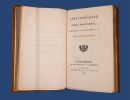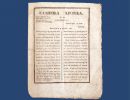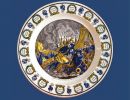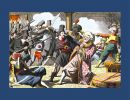Americans were moved by the sacrifices of the Greeks and the poems of Lord Byron. Due to the government policy of neutrality established by the Monroe doctrine (December 1823), it was Americans as individuals who gathered to support the Greek independence movement and established philhellenic societies throughout the United States. A common thread for all these “Grecians” was the effort to understand the land that they encountered not as a mirror of ancient Greece but as a modern nation that strove to stand on its feet.
The American philhellenes were conscious about the importance of the cause and believed in the need to share their experience with the world: the correspondence between Thomas Jefferson and Adamantios Korais centered on the latter’s publication of Aristotle’s Ethics and Politics and discussed the political development of modern Greece; the appeal of Petros Mavromichalis on behalf of the Greek revolutionaries to the “citizens of America” (March 25, 1821) was published in the North American Review—the oldest literary magazine in the nation—by Edward Everett, Eliot Professor of Greek Literature at Harvard; Everett used his connections to promote the Greek cause and advocate for American intervention in the Greek war; press coverage of the war in Greece was readily available in newspapers all over the United States, as were the speeches given by politicians who favored the Greek cause, such as Congressman Daniel Webster, Henry Clay and John Randolph.
Inspiration came from the poems of Lord Byron, his infallible philhellenism and his sacrifice in Missolonghi (1824), as well as the exploits of Greek warriors that left a strong imprint on the American psyche. Fitz-Greene Halleck, an admirer of Byron, was inspired to write the poem “Marco Bozzaris” (1825), in which he expresses his admiration for the Greek hero. The Souliot Markos Botsaris was fatally wounded during a night sortie against the Turkish camp near Karpenisi. His death greatly inspired philhellenic literature and painting as it was compared with that of Leonidas in Thermopylae. Like the Spartans in Abbé Barthélemy's best-seller Young Anacharsis (1788), Botsaris’s men fought valiantly over his body so that the Turks would not take his head as loot.
-
visionaries3
Portrait of Adamantios Korais. Oil painting by an anonymous artist.
The Athens University History Museum
-
visionaries4
Throughout his life, books were vital to Thomas Jefferson’s education and well-being. In the 1780s Jefferson acquired thousands of books for his library at Monticello from Paris, and in 1815 he sold his library of 6,487 volumes to the Library of Congress as a replacement for the collection burned by the British in 1814. Jefferson had a deep knowledge and love for the Greek classics. Among his books there were many Greek editions by Adamantios Korais, e.g. Aristotle’s Nicomachean Ethics. In fact, this particular edition was presented in Everett’s North American Review (October 1823) along with the Appeal of the Messenian Senate to the American people by Petros Mavromichalis.
Gennadius Library, American School of Classical Studies at Athens
-
visionaries5
Photostats of Letters of Jefferson to Korais, October 31, 1823 & Korais to Jefferson, December 28, 1823. Μaterial related to the preparation of a work on Korais by Joannes Gennadius.
Gennadius Library, American School of Classical Studies at Athens
-
visionaries6
Photostats of Letters of Jefferson to Korais, October 31, 1823 & Korais to Jefferson, December 28, 1823. Μaterial related to the preparation of a work on Korais by Joannes Gennadius.
Gennadius Library, American School of Classical Studies at Athens
-
visionaries8
Appeal of the Messenian Senate to the American People signed by Petros Mavromichalis. Everett published the “Messenian Address” sent by the Senate in Kalamata, the capital of that southern Greek province, where they appealed directly to the “just, humane, and generous” American people for aid.
The North American Review, vol. 17/41, October 1823. www.jstor.org/stable/25109218
-
visionaries7
Προσωρινόν πολίτευμα της Ελλάδος και σχέδιον οργανισμού των επαρχιών αυτής. Αμφότερα επιδιορθωμένα και επικυρωμένα υπό της δευτέρας εθνικής νομοθετικής των Ελλήνων συνελεύσεως εν Άστρει, οις έπονται το Πολιτικόν σύνταγμα της Βρεταννίας, και το των Ηνωμένων επικρατειών της Αμερικής. Εν Μεσολογγίω: Εκ της τυπογραφίας Δ. Μεσθενέως, Δημήτριος, 1824.
Gennadius Library, American School of Classical Studies at Athens
-
visionaries
Daniel Webster.
Wikimedia Commons
-
visionaries2
Daniel Webster, Mr. Webster’s speech on the Greek revolution from the Washington edition. Speech on the Greek revolution. Boston: Cummings, Hilliard & Co., 1824.
Gennadius Library, American School of Classical Studies at Athens
-
visionaries9
The passionate philhellene Henry Clay, Representative from Kentucky, addressed Congress at the end of the session on January 23, 1824,
urging them with an enthusiastic speech to adopt the resolution to help Greece.
-
visionaries10
John Randolph, Speeches of Mr. Randolph, on the Greek question; on internal improvement; and on the tarrif bill. Delivered in the House of Representatives of the United States. Washington, 1824.
Gennadius Library, American School of Classical Studies at Athens
-
visionaries13
Portrait of Lord Byron. Adam de Friedel, The Greeks, Twentyfour Portraits of the principal Leaders and Personages who have made themselves most conspicuous in the Greek Revolution, from the Commencement of the Struggle, London, 1832
Gennadius Library, American School of Classical Studies at Athens
-
visionaries14
Personal effects of Lord Byron: Byron’s gold watch in blue enamel case; personal letter seals.
Early editions of the poems of Lord Byron in the United States.
Gennadius Library, American School of Classical Studies at Athens
-
visionaries15
Table clock of gilded bronze (ormolu) and alabaster base. The sculptural decoration represents Lord Byron crowned with laurel and holding a pen.
On the broken panel next to him, the inscription “Childe Harold.”
The Michael and Demetra Varkarakis Collection
-
visionaries16
Exceedingly rare issue of the Greek newspaper Hellenika Chronika published in Missolonghi by the Swiss Johann Jacob Meyer (1824-1826).
No. 29 of the newspaper, printed in a black frame, announces the death of Lord Byron in Missolonghi.
Gennadius Library, American School of Classical Studies at Athens.
-
visionaries17
Glazed earthenware (faience) plate, from the Montereau factory, with the inscription Markos Botzaris dans le camp des Turcs (Markos Botsaris in the camp of the Turks).
The Michael and Demetra Varkarakis Collection
-
visionaries18
The Souliots enter Missolonghi with the corpse of their general Markos Botsaris. Christian Gottfried Heinrich Geissler, Einzug der Sulioten mit dem Leichname ihres Feldherrn Marcos Bozzaris zu Missolunghi. Engraved by Georg Benedikt Wunder, Engraving. Nurnberg: Friedrich Campe, 1831(?).
Gennadius Library, American School of Classical Studies at Athens
-
visionaries19
Heroism and Death of Markos Botsaris.
Christian Gottfried Heinrich Geissler, Heldenthat und Tod des griechischen Häuptlings Marcos Bozzaris in der Nacht vom 19t zum 20ten August 1823.
Engraving by Johann Nussbiegel. Nurnberg: Friedrich Campe, 1825.
Gennadius Library, American School of Classical Studies at Athens
Portrait of Adamantios Korais. Oil painting by an anonymous artist.
The Athens University History Museum
Throughout his life, books were vital to Thomas Jefferson’s education and well-being. In the 1780s Jefferson acquired thousands of books for his library at Monticello from Paris, and in 1815 he sold his library of 6,487 volumes to the Library of Congress as a replacement for the collection burned by the British in 1814. Jefferson had a deep knowledge and love for the Greek classics. Among his books there were many Greek editions by Adamantios Korais, e.g. Aristotle’s Nicomachean Ethics. In fact, this particular edition was presented in Everett’s North American Review (October 1823) along with the Appeal of the Messenian Senate to the American people by Petros Mavromichalis.
Gennadius Library, American School of Classical Studies at Athens
Photostats of Letters of Jefferson to Korais, October 31, 1823 & Korais to Jefferson, December 28, 1823. Μaterial related to the preparation of a work on Korais by Joannes Gennadius.
Gennadius Library, American School of Classical Studies at Athens
Photostats of Letters of Jefferson to Korais, October 31, 1823 & Korais to Jefferson, December 28, 1823. Μaterial related to the preparation of a work on Korais by Joannes Gennadius.
Gennadius Library, American School of Classical Studies at Athens
Appeal of the Messenian Senate to the American People signed by Petros Mavromichalis. Everett published the “Messenian Address” sent by the Senate in Kalamata, the capital of that southern Greek province, where they appealed directly to the “just, humane, and generous” American people for aid.
The North American Review, vol. 17/41, October 1823. www.jstor.org/stable/25109218
Προσωρινόν πολίτευμα της Ελλάδος και σχέδιον οργανισμού των επαρχιών αυτής. Αμφότερα επιδιορθωμένα και επικυρωμένα υπό της δευτέρας εθνικής νομοθετικής των Ελλήνων συνελεύσεως εν Άστρει, οις έπονται το Πολιτικόν σύνταγμα της Βρεταννίας, και το των Ηνωμένων επικρατειών της Αμερικής. Εν Μεσολογγίω: Εκ της τυπογραφίας Δ. Μεσθενέως, Δημήτριος, 1824.
Gennadius Library, American School of Classical Studies at Athens
Daniel Webster.
Wikimedia Commons
Daniel Webster, Mr. Webster’s speech on the Greek revolution from the Washington edition. Speech on the Greek revolution. Boston: Cummings, Hilliard & Co., 1824.
Gennadius Library, American School of Classical Studies at Athens
The passionate philhellene Henry Clay, Representative from Kentucky, addressed Congress at the end of the session on January 23, 1824,
urging them with an enthusiastic speech to adopt the resolution to help Greece.
John Randolph, Speeches of Mr. Randolph, on the Greek question; on internal improvement; and on the tarrif bill. Delivered in the House of Representatives of the United States. Washington, 1824.
Gennadius Library, American School of Classical Studies at Athens
Portrait of Lord Byron. Adam de Friedel, The Greeks, Twentyfour Portraits of the principal Leaders and Personages who have made themselves most conspicuous in the Greek Revolution, from the Commencement of the Struggle, London, 1832
Gennadius Library, American School of Classical Studies at Athens
Personal effects of Lord Byron: Byron’s gold watch in blue enamel case; personal letter seals.
Early editions of the poems of Lord Byron in the United States.
Gennadius Library, American School of Classical Studies at Athens
Table clock of gilded bronze (ormolu) and alabaster base. The sculptural decoration represents Lord Byron crowned with laurel and holding a pen.
On the broken panel next to him, the inscription “Childe Harold.”
The Michael and Demetra Varkarakis Collection
Exceedingly rare issue of the Greek newspaper Hellenika Chronika published in Missolonghi by the Swiss Johann Jacob Meyer (1824-1826).
No. 29 of the newspaper, printed in a black frame, announces the death of Lord Byron in Missolonghi.
Gennadius Library, American School of Classical Studies at Athens.
Glazed earthenware (faience) plate, from the Montereau factory, with the inscription Markos Botzaris dans le camp des Turcs (Markos Botsaris in the camp of the Turks).
The Michael and Demetra Varkarakis Collection
The Souliots enter Missolonghi with the corpse of their general Markos Botsaris. Christian Gottfried Heinrich Geissler, Einzug der Sulioten mit dem Leichname ihres Feldherrn Marcos Bozzaris zu Missolunghi. Engraved by Georg Benedikt Wunder, Engraving. Nurnberg: Friedrich Campe, 1831(?).
Gennadius Library, American School of Classical Studies at Athens
Heroism and Death of Markos Botsaris.
Christian Gottfried Heinrich Geissler, Heldenthat und Tod des griechischen Häuptlings Marcos Bozzaris in der Nacht vom 19t zum 20ten August 1823.
Engraving by Johann Nussbiegel. Nurnberg: Friedrich Campe, 1825.
Gennadius Library, American School of Classical Studies at Athens



















